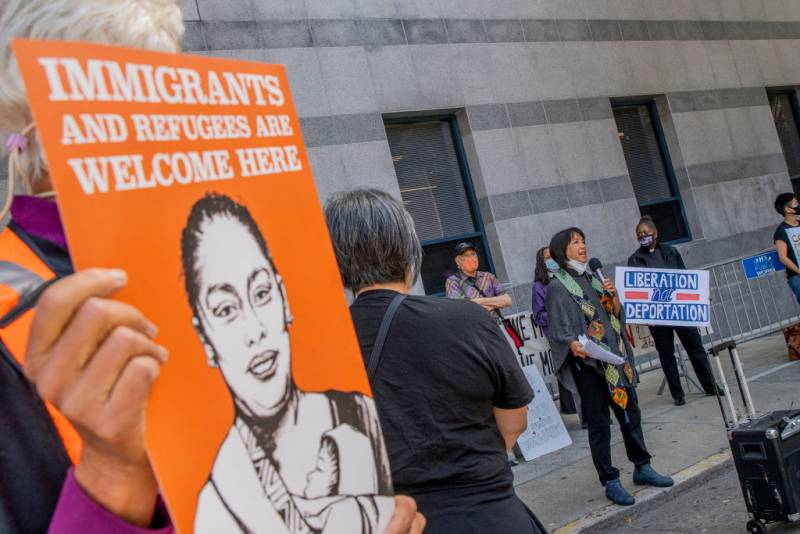“I’m asking my colleagues to update our ‘Due Process for All’ ordinance to add fentanyl dealing felonies alongside violent felonies,” Dorsey told KQED. “The whole idea of sanctuary was to create a safe environment so that local governments could serve immigrant communities, including undocumented immigrant communities, and have their trust. To do otherwise would be to empower organized crime and elements that might exploit people who are in vulnerable situations.”
Under San Francisco’s current policy, local law enforcement can honor an ICE request to hold someone if that person is facing a violent felony charge and was previously convicted of a violent felony — including murder, rape and arson — in the previous seven years, or of a serious felony — including robbery and carjacking — in the previous five years.
Dorsey’s proposal would add people charged with dealing fentanyl to the list of exceptions for sanctuary protections. It would only apply to a person found guilty of selling fentanyl who had been previously convicted of fentanyl dealing or a violent felony in the prior seven years, or a serious felony in the prior five years.
Dorsey said he had not yet examined how deporting suspected dealers has affected the fentanyl crisis in other major cities with looser sanctuary laws. There is also little public data showing what portion of drug dealers in San Francisco are noncitizens.
Dorsey also did not say whether he would support Ronen’s separate resolution rejecting the DA’s request to notify ICE about the two suspects from Mexico.
For her part, Ronen said she opposes Dorsey’s proposal. And she and other immigration advocates say city officials do not need to compromise the city’s sanctuary law, which has been on the books since 1989, for federal immigration officials to arrest either of the suspects if and when they are released from San Francisco jail.
A similar challenge occurred in 2019, when the Department of Homeland Security demanded that San Francisco make an exception to its sanctuary policy to extradite a Tunisian national who had fled to Canada.
City officials ultimately decided they would not cooperate, saying it was unnecessary for DHS to do its work and could ultimately weaken the city’s sanctuary law. Nonetheless, DHS successfully arranged for the suspect to be returned to San Francisco, where he was eventually prosecuted for rape and sexual battery.
Much as they did in 2019, immigrant advocates are supporting Ronen’s call to stand up to federal immigration authorities in the current case.
“I’m urging the Board of Supervisors to remember that lesson from not very long ago that we don’t need to succumb to their distortions,” said Angela Chan, attorney with the San Francisco Public Defender’s Office, who played a role in drafting California’s sanctuary law and updating San Francisco’s policy. “It’s a threat, it’s empty, and we learned this only four years ago.”
“San Francisco should not fall for these tactics,” Chan added. “This is one of many things they do to try to attack our sanctuary ordinance.”
Weakening sanctuary protections would affect not only undocumented immigrants, but also documented immigrants with criminal histories. Any noncitizen is eligible for deportation if convicted of a wide range of crimes.
Jenkins says that while she supports San Francisco’s sanctuary city law, she is seeking an exemption in these particular cases to get the suspects extradited as soon as possible for what she described as “unspeakable crimes.”
“We cannot let two wanted fugitives hiding out internationally get away with murder and sexually abusing young children,” Jenkins said in a statement. “These men must be brought to the United States to face justice and be held accountable for their heinous crimes. We cannot let our well-intentioned policy be exploited in this way and must act now.”
Dorsey also expressed his support for the city’s sanctuary policy, but said fentanyl is so lethal that he thinks it should be treated differently from other drugs.
“I don’t think there is a precedent in drug policy for what we’re seeing with fentanyl. And what’s terrifying is that there are other synthetic opioids on the horizon that are cheaper and more profitable for dealers and drug cartels,” Dorsey said. “We’re in uncharted waters here.”

